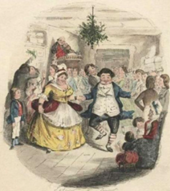We continue looking into Victorian Cambridge through the eyes of Josiah Chater, a young draper’s apprentice. Read on to see what 1844 Christmas had in store for him!
An observation Josiah noted down and was impressed by was the amount of mistletoe on display throughout town. The tradition of kissing under the mistletoe had only began in England a hundred years earlier. The illustrations in Dickens ‘Christmas Carol’ depicted this tradition and its publication in 1843 may well have helped to boost mistletoe sales in the run up to Christmas 1844.
The same book features both the turkey and the goose as options for the Christmas roast. The goose had always been the favoured bird for a large roast but the turkey gradually became more popular because of the bird’s ability to produce a larger quantity of lean meat. Even so, turkeys were more expensive until the 19th century, as geese still were commonplace throughout the rural economy. In December 1844, a goose was 6s 6d, and in December 2024, a 5kg goose is a snip at £115. We’ll make that about 35,000% inflation since Josiah’s time!
Josiah tells us he kept busy during December preparing and dispatching orders for his employer Mr Eaden Lilley. He looked forward to the singing at Christmas as well as opportunities for skating. The pond in Emmanuel College seems to be the most convenient location for this. Of more concern to him, as the weather gets colder, is that deliveries of coal to Cambridge have been affected by the wind in the North Sea blowing the wrong way. He gets a box of extra food from home on the 14th – some wrapped ham sandwiches and a bottle of beer.
He asks his employer, Mr Lilley, for some time off over Christmas, so, on Christmas Eve, he sets off with his brother William about 2.30pm. They walk for the first part of the journey and get as far as Hinxton, 9 miles away. They are met by their father with a pony and cart who takes them on to Saffron Walden. After tea, Josiah visits his grandmother, has his hair cut and then goes off round the town and listens to the musicians who were playing in the streets. These were the Waites.

From medieval times up until the 19th century most towns in Britain had a band of Waites. They were the official musicians whose job was to provide music on occasions such as processions but they also played during winter nights. Waites were often made up of members of musical families. The most famous of such families in Cambridge was that of the Gibbons. The composer Orlando Gibbons (1583 – 1625) came from a family whose father Ferdinando played in the Cambridge Waites. Cambridge colleges would also employ musicians for festive occasions but such activities fell into decline. The last event with which we known the Cambridge Town Waites were associated was the procession of the Mayor to Stourbridge Fair in 1790.
The official Town Waites were generally abolished in the Municipal Corporations Act of 1835. The practise of performing outdoors in the run up to Christmas continued in the hands of enthusiasts who might use the opportunity to collect money, which seems to be the situation in 1844 in Cambridge as described in Joisah’s diary.
On Christmas Day the family goes to church after breakfast. Christmas dinner is roast beef and plum pudding. Josiah has light pudding and gravy later on in the afternoon and then friends come to visit and they played games such as forfeits. Puddings and pies feature widely in cooking of this period. It wasn’t until 1845 in her book ‘Modern Cookery for Private Families’, that Eliza Acton coins the description ‘Christmas Pudding’. Plum pudding had existed for centuries but it was only in the from the 17th century that recipes appear. The pudding would have contained meat as well as sweet ingredients and it had the great advantage, for poor people, of not needing an oven to be cooked in. What it did not contain was plums! Plum in the 18th century referred to the ‘raisin’. Gradually the plum pudding evolved to be sweeter, though it was still served alongside beef on festive occasions, not only Christmas.
Josiah’s family all have supper on Christmas Day at about 9pm – damson, apple and mince pies, with ham and cold beef. Then, on Boxing Day, Josiah gives us a long list of friends and family he visits, picking up, on his way, samples of stewed damsons, grape wine, biscuits, mince pies and parsnip wine. In the evening there are more games.
On Friday the 27th Josiah and his brother set off back to Cambridge. They are taken as far as Stapleford by cart and then walk. They arrive back in Cambridge about 1pm and Josiah is given 3s 6d to buy a silk scarf! On the Saturday another box of goodies arrives from home. More mince pies, gingerbread and apples. On the Sunday Josiah and his brother go to King’s College to hear the singing.
A New Year is about to begin!
To read the relevant transcription of Josiah Chater’s diary follow this link: <Josiah Chater 1844>
